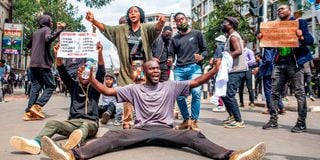
Protesters during the Anti-Finance Bill demonstrations along Wabera street in Nairobi on June 18, 2024.
The hundreds of Kenyans who showed up on the streets of Nairobi to protest against the proposed new taxes on Tuesday rewrote a number of perceptions about a typical anti-government protester.
The youthful looks on their faces, their dressing and even the placards they wielded trampled on the stereotype that protests belong to ragtag delinquents who have nothing else to do — and who are often politicians’ hirelings.
These were sneaker-wearing, smartphone-wielding, neat-looking youth, with ripped jeans here and a football jersey there, an expensive hairdo here and a playful haircut there, who proclaimed – in word and deed – that their angst doesn’t always end with hashtags and memes.
It was a protest by young and daring Kenyans, both male and female, determined to pass a message to the government.
They had voices loud enough to proclaim “Article 37” or “Reject!” whenever a chance arose. There was no shortage of those chances, and the shouts were not coming from the typical protester who is known to hit the streets after copious sips or a couple of puffs.
When they had a chance to sing or chant, they were the quintessential fearless young Kenyan who speaks truth to power.
“Ruto must go” and “yote yawezekana bila Ruto” were uttered in fervour.
Police got an earful.
And oh, the selfies. As the city smouldered with teargas that was lobbed by police every time a substantial crowd gathered, every so often you could see a protester flashing out a phone to shoot a selfie.
On the streets for the first time
A number of the protesters were in the streets for the first time and, in typical Gen Z fashion, they had to “shoot one for the ’Gram”.
There were hashtags to be fed into, among them #OccupyParliament and #RejectFinanceBill2024, and what better way to do it than by shooting content and posting as teargas fumes floated on the tensed Nairobi air?
Twitter influencers Bookten (Dennis Wajala) and Masta Abuya were among the protesters. They were among the legion of social media users who helped spread the message about the protest.
Organisers encouraged protestors to wear black, and there was no shortage of young men and women unapologetically following the dress code.
Speaking with Nation on Kaunda Street while looking behind their backs every so often because a teargas canister could land in the vicinity any moment, the two influencers condemned actions taken by police in responding to the protests.
“The police aren’t supposed to lob teargas. They shouldn’t be arresting people like Hanifa,” said Bookten, who was in black clothes and also donned a T-shirt with the message “Reject Finance Bill 2024. Ina tu affect!”
“Apart from activism on social media, we are on the ground and we are ready. Let police leave us alone. We are here till the MPs vote. Whoever passes it, we are with them in 2027,” added Bookten.
Masta, an influence and taxi driver, showed up in a Chelsea replica jersey.
“I’m really proud just to exercise my duty as a Kenyan under Article 37 of the Constitution. It allows us to picket peacefully, and it was peaceful until the police came in and started arresting us. So far, we are sending a message that we don’t just do it on social media; we can do it on the ground,” he said.
The common perception of a protest is that it is left for men to risk it all as the women seethe from the safety of their abodes.
However, on Tuesday, young women could be heard loudly leading the singing, and some got a ride in police cars for their troubles.
The Nation spoke to three young women in their early twenties who were participating in such protests for the first time.
Twenty-one-year-old Cynthia Mukami said: “I don’t know where we are going as a country, because we are all tired.”
She lamented that her age mates are educated but without jobs and are displeased by the fact that taxes only keep rising.

A protester displays posters during anti-finance bill demonstrations on Moi Avenue, Nairobi on June 18, 2024.
Naserian Kasura said she was opposed to the proposal to tax sanitary pads, adding that she is a campaigner against period poverty.
“This is my first demonstration. I hope it will be the last. I hope things change after this,” she said.
Sheila Ndolo said police need not have used tear gas.
“This is my first demonstration and I am really happy that even the youths, especially the Gen Zs….I’d say we are woke in terms of politics. If that is what it means to be a patriot, I feel patriotic today,” she said.
'We planned the protests on social media'
Zaha Indimuli, 23, said part of the planning happened on TikTok.
“We are the Gen Zs, we were able to mobilise ourselves. We use TikTok as a space to be able to not only have young people come to protest but to educate them on the why,” she said.

Police officers arrest a protestor along Kimathi Street on June 18, 2024 during the Occupy Parliament Protests against the Finance Bill 2024.
“Here is the whole catch. We are young people. We are not scared, we are not moved, and this is only the beginning of the revolution. We are coming, we are many, and we are in good numbers,” added Zaha.
The government has long held fears that social media has the power to stir action, and Tuesday must have given insights into how that can happen.
Speaking in March, Interior Cabinet Secretary Kithure Kindiki noted: “All the social media platforms, including TikTok, now have become a real theatre for misuse by criminals to endanger public safety and security. TikTok and other social media platforms are increasingly being used to spread malicious content, which is illegal, unlawful and a violation of fundamental rights and freedoms.”
The actions of the youth did not escape the attention of the political class, with Narok Senator Ledama Olekina tweeting: “Mad respect for Generation Z.”
Political blogger Pauline Njoroge posted: “They are not just brave, they are also very cool and well spoken. Today’s youth-led protest has been the most peaceful yet very successful. And the government will not have the usual excuse of so-and-so is sponsoring maandamanos.”
Former Independent Electoral and Boundaries Commission member Roselyne Akombe tweeted: “Gen Z! You rock!”
Sakawa Ombeng’i, a fourth year student at Daystar University, was hit in the left hand by a teargas canister. In the typical indefatigable spirit of youth his age, he told Nation yesterday afternoon that he would not be going home until he made his voice felt.
“The economy is already at a dying rate. So, making it even worse is very bad for Kenyans, especially those who believed in this government,” he said. “I felt like my voice would be heard if I was able to come here and participate.”
No throwing stones or looting
Sakawa observed that the young Kenyans who showed up were not interested in throwing stones or looting.
Moses Magero, a Westlands-based tours and tourism graduate, who was also taking part in protests for the first time, told Nation that he was disappointed that he did not make it to Parliament.
“However, let this be a warning shot. It is not always the Mathare and Kibera brigades who show up when it really matters,” said the 28-year-old.










